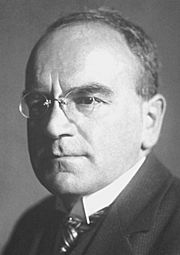Heinrich Otto Wieland facts for kids
Quick facts for kids
Heinrich Otto Wieland
|
|
|---|---|

Heinrich Otto Wieland
|
|
| Born | 4 June 1877 |
| Died | 5 August 1957 (aged 80) Starnberg, Bavaria, West Germany
|
| Nationality | German |
| Alma mater | University of Munich |
| Known for | Adamsite Bile acids research Barbier–Wieland degradation Wieland-Gumlich aldehyde Wieland rearrangement Wieland test |
| Awards | Otto Hahn Prize for Chemistry and Physics (1955) Pour le Mérite for Sciences and Arts (1952) Goethe Medal (1942) ForMemRS (1931) Nobel Prize for Chemistry (1927) |
| Scientific career | |
| Fields | Chemistry |
| Institutions | Technical University of Munich 1913–1921, University of Freiburg 1921–25, University of Munich 1925– |
| Doctoral advisor | Johannes Thiele |
| Doctoral students | Rolf Huisgen, Leopold Horner |
Heinrich Otto Wieland (4 June 1877 – 5 August 1957) was an important German chemist. He won the 1927 Nobel Prize in Chemistry. He received this award for his amazing research into bile acids. Bile acids are special substances found in our bodies that help us digest fats.
Contents
A Scientist's Journey
Heinrich Wieland earned his doctorate degree in 1901. He studied at the University of Munich with his teacher, Johannes Thiele. After that, he continued to teach at the university.
In 1907, he also started working as a consultant for a company called Boehringer Ingelheim. This company makes medicines.
In 1914, he became a professor at the university. He also directed the Organic Division of the State Laboratory in Munich.
Wartime Work
During World War I, from 1917 to 1918, Wieland worked for a research institute. This was instead of serving in the military. He helped with chemical research for military purposes. For example, he found new ways to make certain chemicals. He also created the first version of a chemical called Adamsite.
Teaching and Research
From 1913 to 1921, Wieland was a professor at the Technical University of Munich. He then moved to the University of Freiburg. There, he began studying poisons found in toads and, of course, bile acids.
In 1925, he returned to the University of Munich. He became a chemistry professor there, taking over from another famous chemist, Richard Willstätter.
Mushroom Discoveries
In 1941, Wieland made another important discovery. He isolated a powerful toxin called alpha-amanitin. This toxin is the main harmful substance in one of the world's most poisonous mushrooms. This mushroom is known as Amanita phalloides, or the death cap mushroom.
Helping Others During Difficult Times
Heinrich Wieland was a brave person. During the time of the Nuremberg Laws in Germany, many people faced unfair treatment. These laws targeted people based on their race.
Wieland successfully tried to protect people, especially Jewish students. These students were often expelled from universities because of the laws. Wieland allowed them to stay in his research group. They could work as chemists or as "guests of the privy councillor." This helped them continue their studies and stay safe.
One of Wieland's students, Hans Conrad Leipelt, faced severe consequences. He was punished after collecting money for the widow of Kurt Huber. Kurt Huber was a member of a resistance group.
Family Life
Heinrich Wieland came from a family of scientists. His father, Theodor Wieland, was a pharmacist and also had a doctorate in chemistry. His family owned a business that refined gold and silver.
Heinrich Wieland was also related to the Boehringer family. His cousin, Helene Boehringer, was married to Albert Boehringer. Albert was the person who started the Boehringer Ingelheim company. Heinrich Wieland worked as an advisor for this company for several years. He even helped set up their first scientific research department.
Heinrich Wieland's daughter, Eva Wieland, married another famous scientist. Her husband was Feodor Felix Konrad Lynen. They got married in 1937.
The Heinrich Wieland Prize
Since 1964, a special award has been given out every year. It is called the Heinrich Wieland Prize. This prize honors outstanding research in science.
At first, it was given for studies on fats and related substances. Now, it is awarded for amazing research on important biological molecules and systems. This includes work in chemistry, biochemistry, and how these discoveries affect health.
The Heinrich Wieland Prize is one of the most respected international science awards. It has a successful history of over 50 years. The Boehringer Ingelheim Foundation now sponsors the prize. An independent group of experts always chooses the winners. Since 2014, the prize has included 100,000 euros.
See also
 In Spanish: Heinrich Otto Wieland para niños
In Spanish: Heinrich Otto Wieland para niños
 | William L. Dawson |
 | W. E. B. Du Bois |
 | Harry Belafonte |

